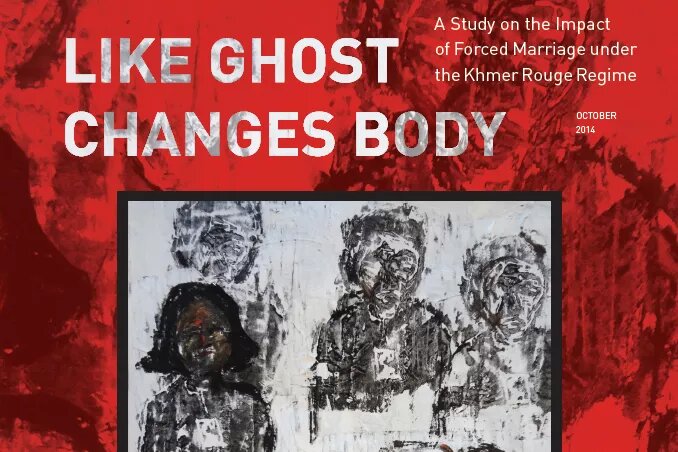
Nearly 40 years after the fall of the genocidal Khmer Rouge regime (1975-1979) the forced marriages and enforced conjugal relations experienced by thousands of Cambodians continue to be little understood as a central part of the general atrocity. These marriages eliminated choice, were without consent, and took place within a context of severe coercion. They deprived victims of the basic right to self-determination in a central life decision, and in many cases they resulted in sexual and physical abuse, psychological trauma, economic deprivation, religious exclusion, and social discrimination. The consequences of the Khmer Rouge policy continue until today.
This small-scale, mixed-method study was undertaken to better understand the impact of forced marriages from the Khmer Rouge period until the present. The research adopts a gender-responsive, trauma-informed approach in providing a description of how the Khmer Rouge policy was implemented and received by victims within the Cambodian cultural context and as part of a specific system of gender identity and roles. The report aims to contribute to a growing body of research on gender-based violence under the regime, long neglected as a scholarly, legal, or development focus, and often suppressed in public historical discourse about the atrocity.
The Extraordinary Chambers in the Courts of Cambodia (ECCC) were established in 2006 to bring the surviving senior leaders of the Khmer Rouge state to justice. Forced marriage, and the rapes that occurred within those marriages, will be tried by the ECCC as an “other inhumane act” under crimes against humanity as part of Case 002-02, which started with the initial hearings on 30 July 2014. Recently, these same crimes have also been requested by the prosecution to be part of investigations for upcoming Case 004.
Deeper understanding of forced marriage and its impacts is therefore timely and relevant. This report hopes to contribute to a greater understanding of these marriages, as well as to provide a basis for discussions about meaningful reparations for victims. Such reparations, the report’s findings suggest, should aim to accomplish societal transformation of cultural norms that perpetuate and normalize sexualized and gender-based violence in times of conflict and in post-conflict within Cambodia.
The research study is based on interviews with 106 Civil Parties to Case 002 about their experiences of forced marriage under the Khmer Rouge regime. All of the participants were interviewed via a quantitative structured survey with limited opportunity for open-ended responses. Additionally, nine respondents in the total sample were interviewed using thematic open-ended questions to form the basis for eight qualitative case studies (with one case study including a forced-married couple interviewed together). Interviews were conducted confidentially and with psychosocial support to mitigate re-traumatization while discussing this sensitive topic. The Transcultural Psychosocial Organization of Cambodia (TPO) was the lead organization for the research, with respondents selected among the general group of Civil Parties and clients of TPO and the Cambodia Defenders Project (CDP) as part of a jointly implemented program on gender-based violence under the Khmer Rouge regime. An international specialist on sexual violence in conflict was commissioned to write the report and was also a member of the research team.
The introduction of the report, Section 2, provides a review of available research on traditional marriage practices previous to the Khmer Rouge period before presenting an inventory of published research on forced marriages under the regime, the impacts of these forced marriages after the fall of the regime until today, and the approach of the ECCC and other bodies—both national and international—to address these impacts. The introduction provides context to the findings of the present research, both quantitative and qualitative, the results of which are presented in the body of the report under Section 4. The report concludes, in Section 5, with a discussion of how the current findings validate, diverge from, or extend the present body of knowledge on how the Khmer Rouge forced marriage policy was operationalized, as well as how its “meanings” were received and impacts negotiated by those forced to marry. Section 5 concludes with recommendations to a range of stakeholders in considering approaches to address the long-term consequences of this widespread sexualized gender based crime as part of transitional justice and on-going development efforts in Cambodia.
This part is extracted from the publication, produced by TPO (Transcultural Psychosocial Organization) in 2014
For full reading, please download the PDF file below: